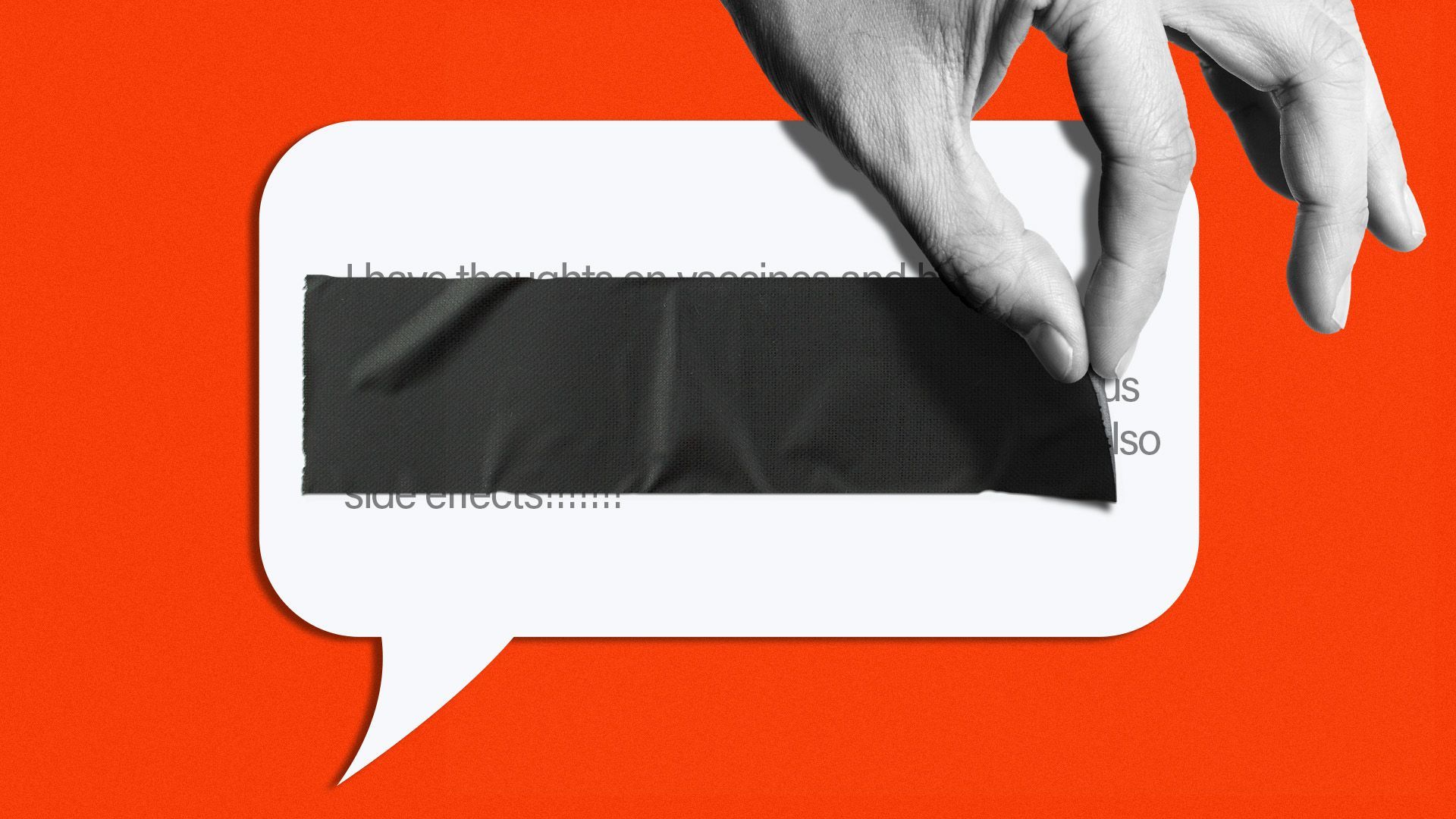
Illustration: Sarah Grillo/Axios
Long-running partisan fights over what speech should be allowed online have bubbled over in a federal case that could actually force Congress to set rules for how the government should engage with tech companies.
Driving the news: The case stems from a battle between the Biden administration and the states of Louisiana and Missouri over alleged free speech violations around COVID-19 content.
Why it matters: What's unfolding is a high-profile test case of just how far government "jawboning," or exerting influence from a position of authority, on social media companies can go, with repercussions that could end up disastrous for any political party or government.
- It's also proof that pressure on speech intermediaries, in this case major social media platforms, are under more pressure that ever, and simply deciding the rules of engagement as time goes on won't stand.
- Different political parties will push for different standards depending on who's in power at the time.
The backstory: On July 4, a federal judge blocked certain Biden administration agency officials from communicating with social media companies about "protected speech," arguing that Biden administration officials had gone too far in pressuring companies to take down anti-vaccine posts.
- The Justice Department appealed the injunction, saying such a block could hurt national security interests, and that same judge, Trump-appointed Terry Doughty, denied the appeal.
- On Friday, the 5th U.S. Circuit Court of Appeals granted a temporary stay of the July 4 order.
The big picture: If Doughty's ruling stands, it will dramatically change the way the U.S. government and social media communicate, something that's grown increasingly important in the past decade.
- Beyond public health emergencies, the government and tech companies communicate about national security, elections, child trafficking, natural disasters and more, coordinating to disseminate accurate information to the public.
- Even an ambiguous ruling will alter that back-and-forth and have a chilling effect on communication.
Details: This case hasn't been particularly flattering for anyone involved, and displays just how messy things get when politicians want the speech they like to be kept online and unwanted speech taken down.
- The case is based on emails in which Biden administration officials pressed tech company representatives to take action on posts expressing skepticism about the efficacy of COVID-19 vaccines.
- In the lawsuit, the state AGs allege the Biden administration threatened action on Section 230 and antitrust, and asked for immediate answers on posts they wanted taken down.
What they're saying: "It strikes me as deeply problematic when government officials use informal methods — bully pulpit, jawboning, behind-the-scenes threats — to achieve results that they couldn't achieve through the democratic process," Matt Perault, former head of global policy development at Meta, told Axios.
- "If the First Amendment prohibits the government from regulating certain speech on tech platforms, then it shouldn't use private pressure as a backdoor workaround to the First Amendment," said Perault, now director of the University of North Carolina's Center on Technology Policy.
- "At the same time, private communication can be very productive when it's focused on learning and sharing information."
The intrigue: The injunction made an exception for "threats to public safety or security of the United States."
- U.S. government officials would say that they were doing just that by advocating for posts encouraging vaccine skepticism to be taken down.
Be smart: The ruling is contradictory, no matter what side you're coming at it from. Genevieve Lakier, a law professor at the University of Chicago, told the New Yorker's Isaac Chotiner about the ruling:
- "Read one way, the injunction chills an enormous amount of speech. Read another way, it doesn’t really change anything at all."
- "But when you get an injunction like this from a federal court, it’s better to be safe than sorry. I imagine that all of the agencies and government officials listed in the injunction are going to think, We’d better shut up."
What's next: Depending on what happens next in the 5th Circuit, the case could end up before the Supreme Court.
